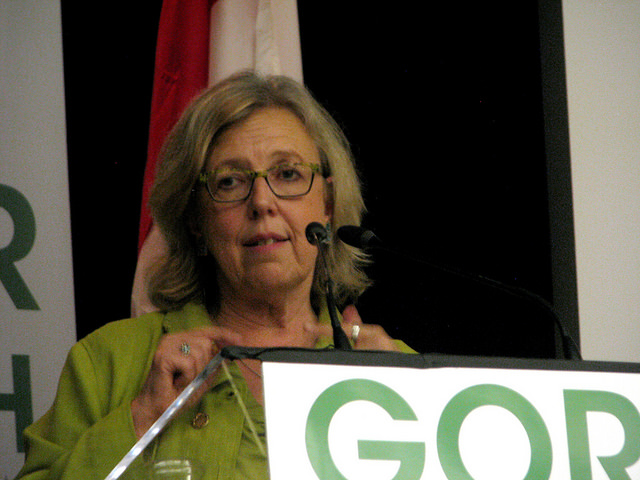Like this article? rabble is reader-supported journalism. Chip in to keep stories like these coming.
She may not remember, but when Elizabeth May first contemplated running for leader of the Green Party, I was among those enthusiastically suggesting she go for it.
Now, as she contemplated giving up the job she has successfully held for the past 10 years, I wanted to offer some unsolicited advice: Don’t resign.
She was thinking of stepping down over her disagreement with a vote at the Green Party’s convention earlier this month endorsing the international campaign for a boycott against Israel known as BDS (Boycott, Divestment and Sanctions).
I’d be very disappointed to see May step down, but I’m also disappointed by media commentary that, in siding with May, has vilified members of the Green Party for taking this controversial stand.
Whether you agree with the boycott strategy or not, it is a peaceful way to protest a serious violation of human rights: the fact that millions of Palestinians have been living under Israeli military occupation in the West Bank and Gaza for almost 50 years, with Israel effectively annexing their land.
Some commentators have suggested that it’s OK to criticize Israel, but a boycott goes too far.
But how then to address this increasingly urgent situation?
For decades, Canada, along with most Western nations, has officially supported the UN’s endorsement of a two-state solution, but has done nothing to pressure Israel to stop building settlements on land designated for a Palestinian state.
This lack of pressure from the West has given Israel’s right-wing government, led by Benjamin Netanyahu, a green light to continue its expansion of settlements, which now house more than 500,000 Israelis, making the creation of a future Palestinian state more and more difficult.
Critics argue that a boycott would unfairly single out Israel, when there are many bad actors in the world.
True, but those nations don’t enjoy the high level of Western support that Israel does. Israel is hailed as a beacon of democracy by Western nations, including Canada.
Given Canada’s strong support, surely Canadians expect Israel to be held to the minimal standard of respecting basic human rights and complying with international law.
It’s true that that a boycott would be divisive, but sometimes that’s inevitable on difficult issues.
Back in the 1980s, it was divisive when Prime Minister Brian Mulroney imposed sanctions against the white-minority regime in South Africa.
Today, everyone agrees that Mulroney’s stance was laudable. But at the time it was highly controversial, with Mulroney acting in defiance of business leaders, members of his own cabinet and caucus, as well as British Prime Minister Margaret Thatcher and U.S. President Ronald Reagan.
Some consider it unfair to compare Israel with South Africa. But Archbishop Desmond Tutu considers the comparison valid. In a 2010 letter to students urging the University of California to divest from Israel, Tutu wrote:
“[D]espite what detractors may allege, you are doing the right thing. You are doing the moral thing… I have been in the Occupied Palestinian Territory, and I have witnessed the racially segregated roads and housing that reminded me so much of the conditions we experienced in South Africa under the racist system of Apartheid.”
Still, the BDS movement remains highly contentious, even as it’s won growing support on North American campuses and among Church and union groups.
It’s apparently having an impact; a 2014 UN report found that foreign investment in Israel had dropped almost by half from the previous year, partly because of the campaign.
But there’s been huge pushback. U.S. casino billionaire Sheldon Adelson brought 50 groups to Las Vegas last year to organize a strategy for fighting BDS.
In Canada, Conservatives and Liberals combined earlier this year to support a Parliamentary motion condemning BDS, without suggesting any alternative for pressuring Israel to stop building settlements on Palestinian land.
In a letter released this week, Elizabeth May clarified that she’s not condemning those who support BDS; indeed, she’s organizing a petition to reverse the Parliamentary vote denouncing it. But she considers the campaign potentially divisive.
But there may be support for it too.
During Israel’s incursion into Gaza two years ago, thousands of Canadians turned out to protest Israel’s bombing — while barely a word of protest was uttered by Canadian political leaders. (May was the most outspoken.)
It could be that many Canadians would like to see their government begin pressuring Israel to end its military occupation.
Certainly, it would take a leader with independence and courage to champion such a bold position — someone like Elizabeth May.
Editor’s note: Elizabeth May announced she will stay on as Green Party leader on Monday at a press conference on Parliament Hill.
Linda McQuaig is a journalist and author. Her most recent book (with Neil Brooks) is The Trouble with Billionaires: How the Super-Rich Hijacked the World and How We Can Take It Back. This column originally appeared in the Toronto Star.
Photo: Laurel L. Russwurm/flickr
Like this article? rabble is reader-supported journalism. Chip in to keep stories like these coming.



